Related Topics
Customs, Culture and Traditions (2)
.
George Washington in Philadelphia
Philadelphia remains slightly miffed that Washington was so enthusiastic about moving the nation's capital next to his home on the Potomac. The fact remains that the era of Washington's eminence was Philadelphia's era; for thirty years Washington and Philadelphia dominated affairs.
Right Angle Club 2010
2010 is coming to a close, a lame-duck session is upon us, and probably after that will come two years of gridlock. But the Philadelphia Men's Club called the Right Angle, keeps right on talking about the current scene. A few of these current contents relate to speeches given elsewhere.
The Republican Court
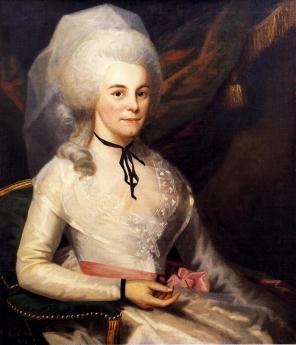
|
| Elizabeth Schuyler Hamilton |
A popular legend of our founding fathers depicts a sudden 18th Century flowering of talent, even genius, establishing a new nation. More recently, historians have searched for personal material about the individual founders, humanizing them with warts, so to speak. A question nevertheless arises how a nation with the present population of Detroit could produce such outstanding leadership in what was then a scattered colonial frontier region. Men, that is. In our legends, the founders were all men.
Long before the feminist movement gathered momentum, historians like Rufus Wilmot Griswold and Abigail Adams Smith had chronicled the impact of the high society of George Washington's term of office as president, which was in part a conscious effort by Washington to show the new republic to the world, cutting just as fine a figure as the nations of old Europe. Martha Washington, soon called Lady Washington, was an uncomfortable central figure in the new social scene, and her dismay at being the President's wife, her anxiousness to retire from prominence as soon as his term was over, suggest the idea for a Republican Court probably did not start with her. Elizabeth Schuyler Hamilton, Alexander Hamilton's wife, might seem more likely but the real originator is not known. For present purposes, a plausible theory is that soldier George Washington and bachelor James Madison had the concept but couldn't pull it off; and then some determined ladies of the court soon showed them all, what was what.
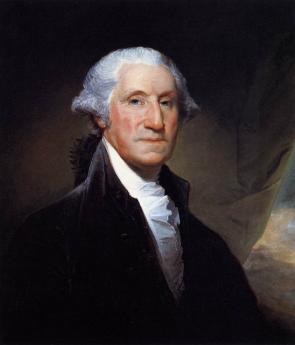
|
| George Washington |
George Washington began the process by instituting formal receptions for visiting males and Martha cooperated by holding Friday evening receptions, at which she was introduced to the wives of important political figures. The regular weekly events of the Presidency soon consisted of a reception by George Washington for new foreign ambassadors and other important foreign visitors, with a formal state dinner with a politically balanced invitation list on Thursday evening, and Lady Washington's reception on Friday with primarily a social purpose, leaning somewhat in the direction of letting the wives of important politicians shine in the social limelight. While the receptions were usually conducted with scripted formality, some notable exceptions were thought worthy of comment. Over twenty years earlier, Washington at Valley Forge had danced for three hours with Cathy Greene, the wife of Nathaniel Greene. When the widow Greene passed through one of the much later presidential levees, Washington suddenly bent over and kissed her, as "an impromptu act of spontaneity." The effect of the levees was to unite the elites of wealth and power, coming to Philadelphia from all thirteen colonies, now risen to statehood. Plantation owners from the South, ship owners, and merchants from the North met the daughters of socially prominent families and quite frequently married them. A courteous and civilized environment unified the new nation at its pinnacle by having local leaders mixing with other local leaders, becoming national leaders in the process. A politician in this new nation could rise to being someone of consequence socially. To be skillful in the social graces, particularly if there was wealth associated, was to advance in politics; to be boorish or loutish was to drop down somewhat in the scale of political influence, slowly but surely losing power to those who did have such graces. Put a backwoods politician into new formal clothes, force him to behave in an unaccustomed way in the midst of those more skillful at it, enlist the fearsome pressure of his ambitious wife to shine in the spotlight; and the fear of looking foolish soon enough pushes him toward conformity.
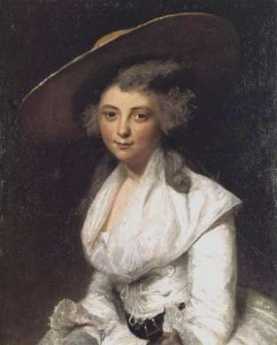
|
| Anne Willing Bingham |
After the first year, then the developing Republican Court. Martha Washington, of course, had her own mansion at Mount Vernon, but Anne Bingham had one within easy walking distance of Independence Hall. The Wife of the richest man in America, Anne Willing Bingham was the daughter of Thomas Willing the head of the most prominent merchant family in Philadelphia. Anne's husband William Bingham had achieved richest-man status at the age of 28 (by running a large privateer fleet in the Caribbean)and was not only able to build a splendid mansion patterned after that of a London aristocrat at 3rd an Spruce Streets,but had taken his young and beautiful wife on an extensive tour of the royal courts of Europe which lasted several years. It is said that Robert Morris later contributed to his own bankruptcy by attempting to match the Bingham mansion with a Morris mansion at 7th and Market, which had to be torn down for lack of money before it was completed. Since most of the wealthy hostesses attempting to achieve prominence in the newly forming Court had never been to Europe, there was no choice but to accept the judgment of Mrs. Bingham in such matters, especially since she had the biggest showplace in town. While the truth of a story about her is uncertain, it accurately illustrates the flavor of the social atmosphere that it could be said that the Dauphin, heir to the throne of France, once went to her father to request her sister's hand in marriage. The young prince was then living in exile at 4th and Locust, in temporarily impoverished circumstances. Old Tom Willing, as the story goes, said No. "If you do not become the King of France, you will be no match for her. And if you do become the King, she will be no match for you."
It does seem to be true almost every prominent lady in the Republican Court was described by contemporaries as astonishingly beautiful, but at least in the case of Anne Willing Bingham, her surviving portraits support this description. John Adams, who had his brilliant wife Abigail for comparison, was overwhelmed by Mrs. Bingham's ability to hold her own on political subjects at the dinner table. And George Washington, who loved to dance with the prettiest lady available, greatly favored Anne as a partner. In time, she asserted herself to the extent of pestering Washington into having his portrait painted by Gilbert Stuart when the painter was in town. Washington ordinarily disliked having his pictures painted, avoiding it when he could. There are nevertheless a great many pictures of Washington on display, crossing the Delaware and whatnot, all showing the same grim face. After his death, it became necessary for most of the many new pictures of him to attach the same Gilbert Stuart head to a variety of imaginary depictions. Benjamin Franklin, by contrast, seemed to enjoy the experience of being a sitter so there are many more portraits of him actually drawn fro life. Add Washington's social sponsorship an almost unlimited personal budget for parties, and Anne Bingham quickly established herself as the reigning queen of the court without even provoking Martha Washington's hostility. This was a busy ladies' world; one new arrival in Philadelphia described herself as exhausted by having to return the courtesy visits of ninety different ladies during her early weeks in town. The expense of such competition emerges from brief reflection on the variety of clothes needed to keep up with changing styles, and the elegance of carriages, footmen, etc.
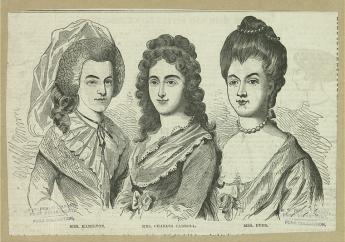
|
| The Chew Sisters |
Anne Willing Bingham was soon joined at the center of things by two Chew sisters, naturally referred to as astonishingly beautiful, who not only had their own mansions, but also Cliveden the summer place in Germantown as available venues for parties. It was commonly stated to be "social suicide, not to be home when the Chew sisters came to call." Delicious gossip was, of course, a strong undercurrent in such a social whirl, and Harriet Chew Carroll made a significant contribution. This daughter of Benjamin Chew the former Chief Justice (and Son of William Penn's personal lawyer)had married the son of very rich Charles Carroll of Carrollton, Maryland, but had to drop out of society because of notoriety associated with her abusively alcoholic husband. Similarly, Catherine Alexander Duer, who had married the son of the New Jersey patriot Lord Stirling, lost her social standing when her husband got deeply into debt in ventures with Robert Morris to the tune of today's equivalent of $40 million. As a Treasury official, there was a question of Duer's using public money to speculate privately, although he died in debtors prison before matters were completely clarified. His wife, who was known for having fifteen different wines on the dinner table, ended up her days running a boarding home to support herself. No doubt other transgressions were suppressed or covered up, while the political process was sufficiently advanced even in the early days of the Republic, to introduce some deliberate falsehood into the gossip mill. No doubt, one of the strongest drinks at the receptions was the bubbly wine of knowing all the inside scoop. And meanwhile, the potential disgrace of falling from favor was immensely powerful in enforcing conformity among those who might otherwise think themselves immune to it.
Some People were left out for various reasons, even if they could keep up financially or politically. It's always a little hard to identify why some people are social duds. Abigail Adams Smith seems to have been one of these, a constant source of adverse commentary about the extravagance, hypocrisy, etc., etc. English literature at this time has Jane Austen and William Makepeace Thackery, Pope Swift, and Dr. Johnson to satirize and constrain the social whirl, but American seems to have produced little more than correspondence and hushed remarks. The feeling of resentment was constantly growing in Republican circles, however, feeding a growing undercurrent of hostility undermining something so elitist and therefore somehow UnAmerican. After ten years in Philadelphia elegance, the District of Columbia was discovered to be scarcely more than a dismal swamp when the capital moved there, a place quite unsuited to high society. Dolley Madison revived things somewhat while acting as hostess for the widower Thomas Jefferson, and when her husband became the next President, opened her receptions to the general public. One can easily imagine the intense hostility of Andrew Jackson to any of this, however. Washington DC has since evolved a pallid political social whirl because America still has politically ambitious rich folks and plenty of money for indirect lobbying. But it hasn't ever been the same as the glory days in Philadelphia, and probably never will be. Present members of the financial/political elite who now work in Washington are in a great hurry to leave town every weekend, abandoning its empty office building to the tourists and civil servants.
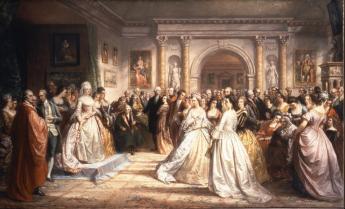
|
| The Republican Court |
The Republican Court served an important role in helping America unify thirteen colonies into a single nation. Because Philadelphia was for a time the center of the country, economically, socially and politically, all people of prominence in here, wanted to know each other. Variations of wealth and breeding stratified the women somewhat differently from the Variations of wealth and power of their husbands, ad constant mixing of the two strata unified the leadership of the new nation in ways that would have developed more slowly without it. The forced conversations of the receptions stratified independently but helped all the newcomers to the scene to adapt to the realities more comfortably. Each group, private and public watched a constant parade of aggressive climbers sort themselves out and searched for how they had made out; wealth got you to the top in one group, private and public, watched a constant parade of aggressive climbers sort themselves out and searched for how they had made out; wealth got you to the top in one group, power got you there in the other. But in both groups, the cruelties of social striving made the iron rule clear that such things as wit, gracefulness, physical attractiveness, education and breeding were qualities that floated you to the top of the soup of any flavor. When you are forming a new nation, perceptions of that sort are important to acknowledge. The American aristocracy could be circumvented among the many ways to the top, could be sneered at by those who lacked its unattainable features, and could be sniggered at by real aristocrats of real aristocracies in Old Europe. But it served well enough as a role model for a constant stream of new immigrants, and set a pattern for new communities of the interior, also seeking a sense of cultural direction. Like the breeding of horses and dogs that is such a constant upper-class avocation, there is a genetic message, too. Rich men marry beautiful women, so their children or grandchildren tend to be handsome. Handsome or not, gracefulness in social circles is learned at home. Darwin teaches you one thing, Adam Smith's hidden hand teaches another; both are worth attending to. Given eight or ten generations, this sort of evolutionary pressure forms a community, then a nation. It has certainly left major imprint on Philadelphia.
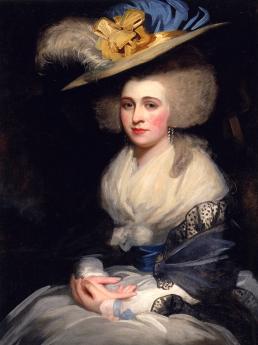
|
| Abigail Adams Smith |
On the rest of the nation as well, but in different ways. Along the East Coast, first families tend to persist and went to school so to speak in Philadelphia during Washington's presidency. Mary Ann Goodrich was a witty and Wealthy wife of a Connecticut political leader. Elizabeth Schuyler Hamilton was the famously vivacious wife of Alexander Hamilton of New York. Alice De Lancey Izard was the toast of Charleston, South Carolina. Patsy Jefferson Married Thomas Randolph of Virginia. Mary White Morris of Philadelphia had a bumpy trip as the wife of Robert Morris. In East Coast high society, the ladies usually have middle names.
Over three centuries, three main streams of immigrants plodded their way across the continent to the West and then merged. There were westward pioneers from north of Philadelphia with a certain kind of accent, from South of Philadelphia with another, and from Philadelphia with the normal way of talking. Each of them was following role models within its own cultural pattern, but the significance of middle names is now only a tip-off to insiders. There are patches of country, like Appalachia we are Texas, which brush off any allegiance to distant origins. But to the degree we are unified, the Philadelphia mixing bowl of the Social Scene during George Washington's presidency is a big part of how we got that way.
Originally published: Tuesday, January 26, 2010; most-recently modified: Friday, June 07, 2019